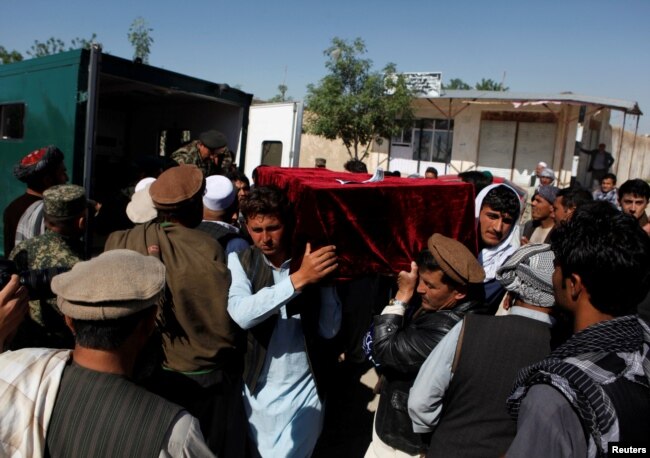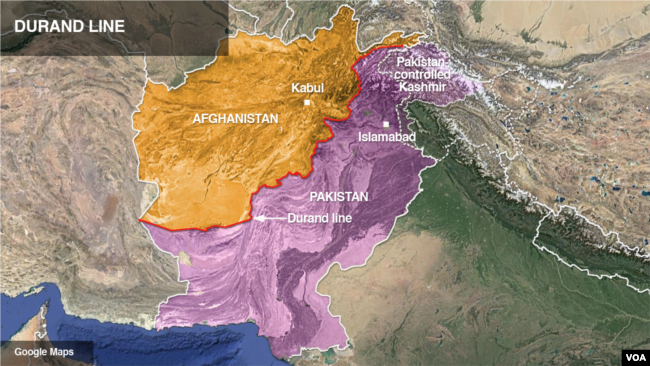Noor Zahid
 As Washington considers sending more U.S. troops to Afghanistan, analysts are skeptical whether the move would help quell a resurgent Taliban or push the insurgent group to the negotiating table.
As Washington considers sending more U.S. troops to Afghanistan, analysts are skeptical whether the move would help quell a resurgent Taliban or push the insurgent group to the negotiating table.
U.S President Donald Trump is expected to announce his Afghan policy later this month and his advisers are reportedly recommending adding up to 5,000 additional American troops.
Security analysts say a troop surge would not make a difference unless additional steps are taken including reforms within the Afghan government and convincing Pakistan to break ties with militant groups in Afghanistan.
"The troop surge in itself won't lead to either the defeat of the Taliban, it won't even slowdown their advances," said Ioannis Koskinas, a senior fellow at New America, a research institute in Washington. "It is also not going to bring them to the negotiation table. Why should they? They think they are winning and 3,000 troops is not going to dramatically change the dynamics."
Speaking Thursday during a U.S. Senate Intelligence Committee hearing, the Director of National Intelligence Dan Coats said the Taliban is likely to make gains in rural areas while the government is being undermined by the country's "dire economic situation."
A U.S. watchdog estimates Taliban controls around 11 percent of districts with some 30 percent contested in battles with Afghan forces.
 Analysts agree with Coats and other U.S. officials who say the Afghan security and military apparatus needs to be fixed.
Analysts agree with Coats and other U.S. officials who say the Afghan security and military apparatus needs to be fixed.
"The Afghan government must start assigning merit-based appointments of competent individuals in key security posts," Koskinas said. "Without strong leadership, that is currently lacking in the ministries of defense and interior, and from operational to tactical units, the surge of troops has no chance of improving security or countering the Taliban expansion."
Corruption in the ranks
FILE - Relatives carry the coffin of one of the victims a day after an attack on an army headquarters in Mazar-i-Sharif, northern Afghanistan, April 22, 2017.
Besides battling an emboldened insurgency, Afghan security forces face rampant corruption in their ranks.
"The ineffective and corrupt Afghan government is one of the problems," said analyst David Des Roches, who teaches at the National Defense University in Washington. "I think the Afghan government reform should be our priority."
The watchdog, U.S. Special Inspector General for Afghanistan Reconstruction (SIGAR), has repeatedly warned that corruption and mismanagement could lead to military failure in the country.
"Afghanistan has enough security forces and if they are strategically used under the right leadership, they are capable of defending the country," said Afghan lawmaker Abdul Jabbar Qahraman, who was tasked by Afghan President Ashraf Ghani to oversee anti-Taliban offensives in the southern restive Helmand province.
Additional U.S. troops would be most beneficial if they are used to prop up Afghan forces and enable them to succeed, analysts say.
"The new plan should strengthen the capabilities of the Afghan national army that the U.S. has been training," said Wadir Safi, a Kabul University professor of politics. "They should get more training and equipment to eventually take over the country's defense and security."
Pakistan's link

The Durand line, on the Afghanistan-Pakistan border
But Taliban do not operate in Afghanistan alone.
Afghanistan has long accused Pakistan of tolerating and supporting militant groups that have carried out attacks across their shared borders. The United States has also pressed Islamabad to do more to crack down on such groups. Pakistan rejects allegations of employing proxies from its soil, saying Pakistan itself is a victim of terrorism.
But analysts say a U.S. troop surge in Afghanistan must be accompanied with forcing Pakistan to crackdown on support the Afghan Taliban receive from sanctuaries on Pakistani soil.
"Pakistan is not helping the security situation in Afghanistan," analyst Koskinas said. "Their [Pakistan] support for the Taliban has not been curbed by American carrots. But we've never really applied any sticks as complement to the carrot. The U.S. needs a separate and comprehensive strategy to influence Pakistan."
Pakistani defense analyst, Talat Masood believes that Islamabad should take the impending U.S. troop surge as a signal that the U.S is serious about ridding insurgency in Afghanistan and the region.
"Pakistan needs to cut its links with the Taliban," he said.
Still, Coats conceded Thursday that Afghanistan is likely to struggle until it can either contain the insurgency or reach a peace agreement with Taliban. And analysts wonder whether the U.S. troop surge would succeed in doing that.
"Can you put enough pain on the Taliban that they would say we can't go on with this and we will go for a negotiated settlement?" Des Roches asked. "There are Pakistani safe havens whether it is due to Pakistani lack of ability or Pakistani collusion, and as long as they [Taliban] are fighting for their life, it seems unlikely that this will defeat them."
VOA's Afghan, Deewa and Urdu services contributed to this report.
No comments:
Post a Comment